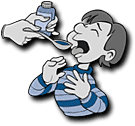|
Upper respiratory infections (URIs) are one of the most common reasons parents bring their children to the doctor. A frequent symptom of a URI in children is coughing, which can make children - and their parents - miserable over time. Most of the time, a doctor will simply recommend an over-the-counter cough syrup to take care of the condition, or prescribe a stronger cough syrup, if the cough is severe, but as this study shows, cough medicines don't always do what they're supposed to.
Researchers examined 100 children with URIs and divided them into three groups. The first group received a syrup containing dextromethorphan, a common ingredient in cough syrups. The second group received a syrup containing another common ingredient, diphenhydramine. The third group received a placebo syrup that was identical in appearance to the other two syrups, but had no ingredients intended to improve cough symptoms. Parents were asked to rate the children's symptoms of coughing, along with other factors, over a 24-hour period.
 When the researchers compared the parents' ratings, they found that the medicated cough syrups were no better than the placebo in preventing coughs or improving children's sleep. In fact, children given the placebo syrup coughed less frequently than children given syrups containing either active ingredient. When the researchers compared the parents' ratings, they found that the medicated cough syrups were no better than the placebo in preventing coughs or improving children's sleep. In fact, children given the placebo syrup coughed less frequently than children given syrups containing either active ingredient.
As this study suggests, cough medicines appear no better than a "fake" medicine at reducing children's coughs and helping them, or their parents, sleep easier during the night. While this doesn't mean that medicated cough syrups aren't any good, you may want to ask your doctor about these study results and investigate more effective alternatives.
A substantial body of research suggests that many commonly prescribed medications are ineffective and/or associated with dangerous side-effects.
To learn more, visit www.chiroweb.com/find/archives/general/drugs.
Reference:
Paul IM, Yoder KE, Crowell KR, et al. Effect of dextromethorphan, diphenhydramine, and placebo on nocturnal cough and sleep quality for couching children and their parents. Pediatrics July 2004;114(1):e85-90.
|



